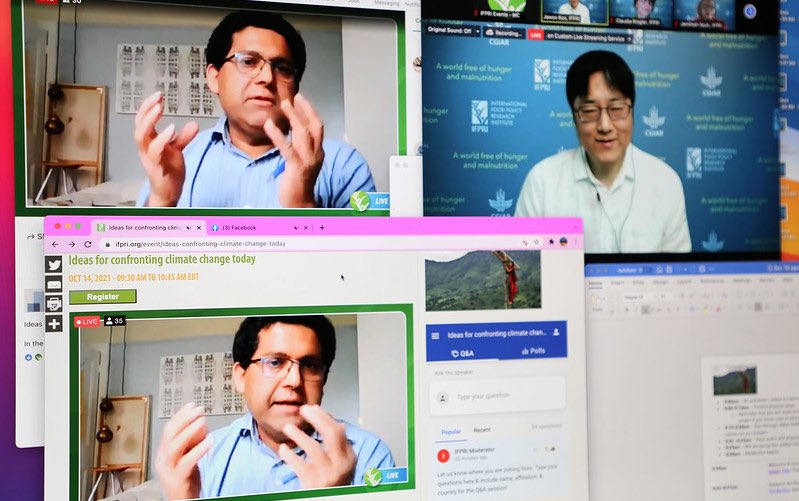As climate change impacts escalate, food systems around the world and the people and communities depending on them face a range of problems including extreme weather events, the effects of heat on agricultural productivity, and limiting greenhouse gas emissions. In advance of the UN Climate Change Conference (COP26) underway Oct. 31-Nov. 12 in Glasgow, IFPRI researchers discussed four ideas for confronting these climate challenges at an Oct. 14 policy seminar.
Rui Benfica, IFPRI Senior Research Fellow, emphasized the importance of research and development on the future of food systems under climate change. “Global agricultural productivity growth is not accelerating fast enough to sustainably meet the needs of everyone on the planet by 2050”—with the more severe impacts likely to fall on middle and low-income countries, Benfica said. Investments in research, with help from the private sector, have the potential to alleviate climate impacts on prices, crop land expansion, and greenhouse gas (GHG) emissions. While agricultural R&D has tripled in the last thirty years, however, “some of the commodities of nutritional importance such as legumes, tubers, beans, are being neglected,” Benfica said.
Claudia Ringler, Deputy Director of IFPRI’s Environment and Production Technology Division, explained how clean energy access can help transform food systems. An estimated 600 million people in Africa south of the Sahara live without electricity, she said, which affects livelihoods and overall rural and economic growth. Lack of energy access also correlates with poorer agricultural performance—more GHG emissions, increased zoonotic disease risk, and lack of proper storage of perishables, to name a few. Improving energy access in rural areas requires generating more evidence for its benefits and the costs of inaction, Ringer said, “and we need to really assess and identify cross-sectoral solutions using energy as an entry point.”
Wei Zhang, IFPRI Senior Research Fellow, said that engaging stakeholders in climate-smart landscape management is another key element in climate mitigation. “Research has shown that collective action institutions are very important for technology transfer in agriculture and natural resource management,” she said, as they aid in spreading information and practices to address climate change. This requires fostering better communication among community members. In addition, “local policy responses are necessary to compliment national policies that do not specify benefits for smallholders,” Zhang said.
Jawoo Koo, IFPRI Senior Research Fellow, outlined how harnessing digital technologies can aid in managing climate risks that food systems face. Predictive analytics can be used to plan for hard-to-anticipate local climate impacts, and improved public information systems can help “stakeholders to access the information quickly and monitor policy impacts,” he said. Real-time data from sensors, satellite remote sensing, and crowdsourcing campaigns are a few of the ways information is gathered to make informed decisions and optimize the performance of food supply chains as climate impacts grow.
Jemimah Njuki, IFPRI Director for Africa, said that using all these innovative approaches to mitigate climate change will require sustained action from stakeholders across government and the private sector, “working very close with local stakeholders and communities to ensure that what comes out of this benefits them and fits within their farming and food systems.”
Karla Estrada is an IFPRI Communications Intern.







